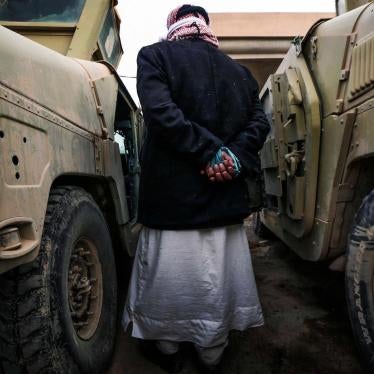Saudi Arabia's new terrorism law might look like a step forward, if only because it's written down. Saudi Arabia is one of the few countries with no written criminal penal code, and the penal regulations that authorities have issued are so vague that Saudis are mostly in the dark about what specific acts constitute crimes.
The Penal Law for Crimes of Terrorism and its Financing (the "terrorism law") is the latest of a series of criminal laws that Saudi officials have created over the last five years, under international pressure to reform the criminal justice system. But instead of achieving their stated purpose of defining specific crimes, in practice these piecemeal reforms have created a veneer of legality for ongoing human rights abuses by Saudi criminal justice authorities. The terrorism law is no exception.
The terrorism law is a vague, catch-all document that can—and probably will—be used to prosecute or jail anyone who criticizes the Saudi government and to violate their due process rights along the way.
Consider, for example, the case of Mohammed al-Bajadi, a young Saudi political and civil rights activist. He has largely remained (PDF) behind bars since March 21, 2011, a day after he helped organize a small demonstration in front of the Interior Ministry in Riyadh for Saudis who say the authorities are arbitrarily detaining their relatives.
Authorities held al-Bajadi in incommunicado detention for four months and in March 2012, Saudi Arabia's terrorism tribunal—the Specialized Criminal Court—convicted him and sentenced him to four years in prison and a five-year ban on foreign travel. Al-Bajadi refused to participate in the trial proceedings because they were closed to his family and the public and he did not have a lawyer during interrogation or trial. The charges under which the court convicted him relate solely to his peaceful activism, including "participating in setting up an unlicensed association," "distorting the reputation of the state through the media," "insulting the impendence of the judiciary" and "inciting protests and sit-ins."
On August 6, 2013, just before the Islamic Eid al-Fitr holiday, authorities suddenly released al-Bajadi from al-Ha`ir prison without explanation, sending him out on a deserted road south of Riyadh, forcing him to ask passers-by for a phone to call his family. Less than a week later, authorities re-arrested him and returned him to the prison—also without explanation.
Under the new terrorism law, many of the severe due process violations that al-Bajadi suffered—including arbitrary arrest and detention on vague charges, incommunicado detention, lack of access to a lawyer during the investigation stage and closed trial proceedings—are now "legal" in Saudi Arabia.
The problems with the law begin with its extraordinarily vague and overly broad definition of terrorism. Other countries restrict the definition of terrorism to violence intended to force a state to take or refrain from a particular action. The Saudi law only refers to violence as an element of the crime with regard to attacks carried out against Saudis outside the kingdom or onboard Saudi transportation carriers. Inside the kingdom, "terrorism" can evidently be non-violent—it comprises "any act" intended to, among other things, "insult the reputation of the state," "harm public order" or "shake the stability of the state," which the law fails to clearly define.
The practice of Saudi courts indicates that there is a serious risk that they will apply these terms in the terrorism law not just to terrorists but to peaceful dissidents as well. Al-Bajadi's charges, for instance, include "distorting the reputation of the state through the media." The Specialized Criminal Court is currently trying Fadhil al-Manasif, an activist from the Eastern province, on charges that include "contacting foreign news agencies to exaggerate news and insult the government of Saudi Arabia and its people." In 2013, Saudi courts convicted several prominent activists from al-Bajadi's group, the Saudi Civil and Political Rights Association—including Abdullah al-Hamid, Mohammed al-Qahtani and Abd al-Kareem al-Khudr—on charges that included "disturbing public order." All three are serving long prison sentences.
The law applies not only to Saudi citizens or residents, but to non-Saudi citizens outside the kingdom, who could face terrorism charges for aiming to "infringe on the interests of the kingdom, or its economy, or its national or social security." It remains to be seen how Saudi authorities will use this overly broad provision, but it is vague enough to potentially apply to non-Saudis abroad who merely criticize Saudi Arabia's human rights record, such as journalists or international human rights activists.
The terrorism law also grants extensive powers to the interior minister that undermine the due process rights of the accused in existing Saudi law. The new law authorizes the minister to order the arrests of terrorism suspects himself, without going through the public prosecutor, as well as to access the suspect's private banking and communications information, all without judicial oversight.
The law guarantees access to lawyer, a right not granted to al-Bajadi in 2011. But access to the lawyer doesn't begin until an undefined time determined by the investigating agency, instead of during interrogation, in direct opposition to the explicit guarantees in the Saudi criminal procedure law. The law also raises the current legal limit on the time officials may hold a suspect in pretrial detention from six to twelve months, with unlimited extension upon court order, and allows for incommunicado detention of suspects for up to 90 days from the date of arrest.
The law also gives the Specialized Criminal Court—to which it assigns jurisdiction over terrorism cases—the authority to hear witnesses and experts without the presence of the defendant or the defendant's lawyer. It requires the court only to inform them of the content of the testimony after the fact, greatly hampering their right to challenge this evidence though cross-examination.
The law undermines the presumption of innocence for people suspected of terrorism-related crimes by giving criminal justice authorities the right to send them—including those who have not faced trial—to special "rehabilitation centers" that aim to "correct incorrect concepts" or "deepen patriotism" in lieu of detention and prosecution.
If Saudi authorities want to make a true step forward in codifying criminal law, they should start by ditching the new terrorism law. The authorities could also amend the law to remove the arbitrary powers assigned to the interior minister without judicial oversight and to stipulate a clear definition of terrorism that could not be applied to peaceful dissidents and activists. But such amendments would require the revision or abrogation of most of the law's existing articles.
In fact, Saudi authorities should review their entire criminal law codification strategy to ensure that any law it puts into effect spells out clearly defined criminal behavior and does not contradict international standards by criminalizing basic rights. Anything less constitutes a setback for human rights in the kingdom rather than an advance.









